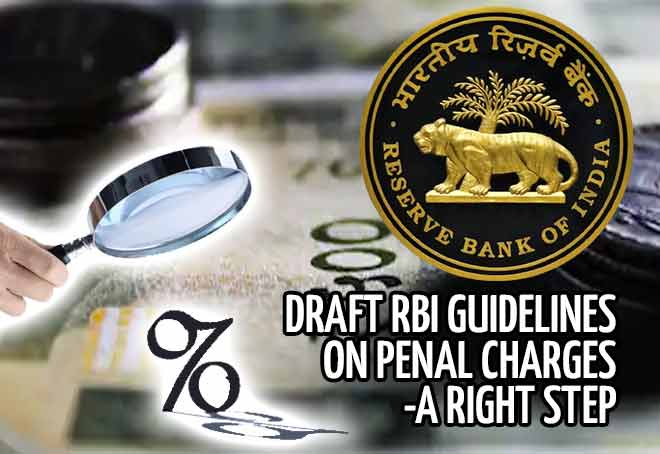Draft RBI Guidelines on Penal Charges - a right step: KNN Analysis
Updated: Apr 26, 2023 07:00:34pm

Draft RBI Guidelines on Penal Charges - a right step: KNN Analysis
New Delhi, Apr 26 (KNN) Reserve Bank of India (RBI) has recently issued draft guidelines on Penal Charges in Loan Accounts that prohibits Penal Interests charged by Banks, NBFCs etc on non - compliance of borrowing terms by the borrowers. This must have happened after repeated representations by the small borrowers, particularly MSME Associations on the illogical charging of atrocious penal interests by the Banks on literally drop of a hat.
The significant aspect of the Guidelines is Banks have been asked to stop charging penal interest for any default in payment or non – compliance of loan conditions by the borrowers as is the present practice. Instead, they have been allowed to charge penal charges on a reasonable, transparent and non- discriminatory basis. The immediate pay off is disallowance of compound interest on any unpaid penal charges as is being imposed on penal interests by Banks.
The guidelines may be summarised in simple terms as follows –
-- i) Banks shall charge interest on loan account strictly as per RBI instructions. There shall be no other component of interest, namely, penal interest, under any situation.
-- ii) Penalty, if any, charged by the Banks on default or non-compliance of Loan conditionalities will be transparent and uniform for all loan accounts and the policy to be decided at the Board level of the Banks concerned.
-- iii) The quantum of penal charges will be proportionate to the extent of default or non-compliance and shall not be at the whims of the Managers or other executives.
-- iv) The penal charges cannot be compounded, that is, no further interest could be charged on a particular penal charge levied.
-- v) While the rate of interest charged by a Bank on a loan account may vary from borrower to borrower depending upon the credit risk assumed by the Bank, the penal charge will be uniform for all loan accounts for a particular type of non-compliance. Of course, it may vary proportionately with the extent of default.
-- vi) Bank will decide the limit of default or non-compliance above which only the penal charges will be applicable.
RBI has also directed that all penal charges will be as per a laid down policy to be decided at the Board level of the Banks and this shall be uploaded on the website of the Banks and also to be clearly mentioned in the loan agreements and other related documentations.
The guidelines issued will bring great relief to borrowers particularly small borrowers and MSMEs who are kept on the tenterhooks by the Banks. Even for closure of loan accounts or shifting of loan accounts from one Bank to another, hefty penal interests are charged by the Banks.
RBI has rightly mentioned in the guidelines that the penal charges are to be levied to discipline erratic borrowers and it should not be taken as a source of income by the Banks, which exactly is being done now by the Banks particularly the private Banks. With interest margins under serious pressure, Banks are taking all means to fleece the borrowers and RBI has rightly intervened to control the penal interest syndrome.
However, the sufferers will surely say that RBI could have been more upfront in its guidelines. Left to their discretion the Bank Boards particularly of private Banks will charge any type of penalty to enhance income. It would have been ideal if RBI mentioned an illustrative list of penal charges for different types of defaults and non -compliance of borrowing conditions by the borrowers.
For example, there are cases where an account is charged penal interest when the borrower / guarantor expires and there is delay in mutation of the collateral properties. Again, defaults due to natural calamities like Flood, Fire etc., are also charged penal interests.
Globally defaults are being analysed by the Banks and default accounts are being put into different buckets, namely, wilful defaults, defaults due to external conditions, due to delayed payment, due to sudden regulatory burdens, due to endemics etc. and differential rates of penalty are being imposed according to the reasons of default. Same approach is needed to be followed in India and RBI should start the ball rolling.
Hefty penal charges for closure of loan account or shifting of accounts from one Bank to another is an archaic rule. As working capital accounts are practically perpetual, closure of such account anytime will call for penal charges in the present regime, putting the borrowers in perpetual bondage. Logically Banks should not charge any penalty if the loan accounts are closed after a certain period, say 2 years, as followed for many personal loan accounts. Here also immediate advisory from RBI is needed.
In all, while the present guidelines of RBI will be highly welcomed by the MSMEs, they will surely expect further clarifications and directives to control the unruly earning spree of the private banks.
(by Debashis Bandyopadhyay, Former Director MoMSME for KNNIndia)













